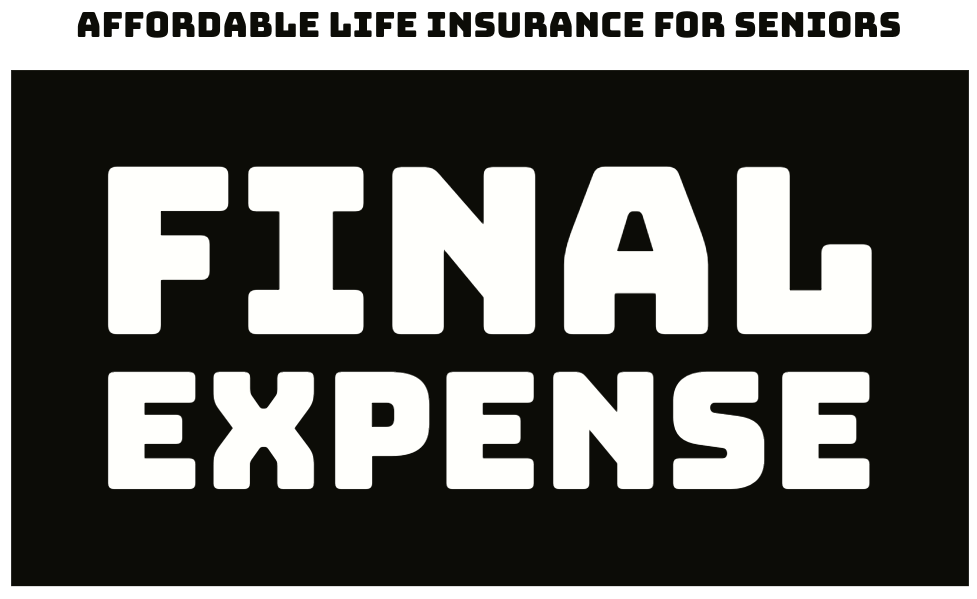What are the best senior life insurance options available? In this guide, we’ll explore various types of life insurance for seniors, including term, whole, universal, and final expense policies. Our goal is to help you understand your choices and find the right plan for your needs and budget in 2025.
Key Takeaways
-
Term life insurance offers affordable coverage for seniors but may become more expensive with age, making health and financial considerations crucial.
-
Whole life insurance provides lifelong coverage and a cash value component, offering financial stability, though it typically comes with higher premiums for seniors.
-
Universal life insurance allows seniors flexibility with adjustable premiums and death benefits, tailoring coverage to meet evolving financial needs.
Term Life Insurance for Seniors

Term life insurance is recognized for its cost-effectiveness, which has made it a favored option among older individuals. This type of life insurance delivers coverage over a predetermined time frame, commonly set at 10 or 20 years, establishing a financial safety net within this period. Seniors frequently choose term life due to the advantage of lower premiums when contrasted with permanent life insurance policies, thereby offering an economical solution for securing their family’s financial well-being.
Nevertheless, as one ages, the expense associated with term life can escalate, potentially making it less accessible to elderly seniors. When deciding on the proper amount of coverage, necessary factors such as age status in health and specific fiscal objectives play crucial roles.
Convertible term policies
Convertible term policies provide a distinct advantage through their versatility, which can be exceptionally advantageous for older adults. Such policies enable the conversion from term life insurance to permanent life insurance without requiring a medical check-up. This aspect is crucial as it ensures the ability to preserve life insurance coverage despite shifts in health status, thereby guaranteeing uninterrupted safeguarding.
It affords seniors the opportunity to modify their life insurance arrangements in alignment with evolving health and economic circumstances without worrying about having to requalify for coverage.
No exam term policies
Term life insurance policies that don’t require a medical exam are tailored specifically for seniors who may have pre-existing health conditions. Instead of undergoing a comprehensive medical examination, applicants only need to complete a brief health questionnaire. This streamlined approach expedites the application process and offers vital life insurance protection to individuals who might find it challenging to obtain coverage due to their health status.
By dispensing with detailed medical exams, these types of policies simplify the path for seniors seeking financial safeguards for their loved ones, ensuring they can attain this security more effortlessly.
Whole Life Insurance for Seniors

Whole life insurance provides enduring protection, ensuring that your family is protected from economic hardship following your departure. The policy features a cash value accumulation over its tenure, offering the added benefit of a savings element that can be utilized if necessary.
For many seniors, whole life insurance acts as an essential financial safety net to help maintain their loved ones’ well-being. Although coverage amounts tend to be modest and premiums higher for older individuals, the consistent reliability and defense provided by whole-life policies render them a worthwhile choice.
Cash value growth
Whole life insurance offers a noteworthy advantage in its cash value aspect, which steadily increases akin to the workings of a tax-deferred savings account. This growing cash reserve can serve as an adaptable financial tool for handling emergency situations, supporting retirement plans or managing various fiscal demands.
Such accumulation within whole life policies contributes to economic security for older adults by furnishing a steadfast resource that can be utilized during urgent circumstances or other financial necessities.
Premium stability
A key characteristic of whole life insurance that distinguishes it from other forms of life insurance is its consistent premium payments. When you purchase a whole life policy, the premiums are set and do not change for the entirety of the policy’s term.
This stability in cost makes whole life coverage especially advantageous for seniors who rely on fixed incomes, as it allows them to manage their budgets and engage in financial planning without worrying about changing insurance expenses.
Universal Life Insurance for Seniors

Universal life insurance stands out due to its adaptable nature, which allows policyholders to fine-tune their premium payments and death benefits according to their evolving requirements. It enables older individuals the convenience of altering premium amounts within specific boundaries, thereby aligning with shifts in their financial status.
This variety of life insurance also offers flexibility in modifying death benefits, providing seniors with the option to customize coverage in response to alterations occurring within their lives and ensuring personalized protection.
Adjustable premiums
Universal life insurance provides a crucial benefit for seniors through its adjustable premium structure, which enables them to tailor their insurance expenses to fit their fluctuating financial situation. This flexibility allows older policyholders to reduce their premiums during times of financial constraint and raise them when they have additional monetary resources, ensuring that the affordability and continuity of their life insurance coverage is maintained during retirement.
Flexible death benefits
The ability to adjust death benefits in a universal life insurance policy allows seniors to tailor their coverage to their evolving needs. Whether it’s increasing the death benefit to provide more substantial support for family members or reducing it to lower premium costs, this flexibility ensures that the insurance policy remains relevant and effective.
This flexibility is especially valuable for seniors expecting changes in financial obligations or family needs.
Final Expense Insurance

Specifically crafted to address end-of-life expenses including funeral and cremation costs, final expense insurance emerges as an essential option for older seniors. It serves the purpose of safeguarding families from hefty financial obligations at a challenging juncture.
Targeted towards mitigating the burden of end-of-life costs, final expense insurance presents itself as a viable selection for elderly individuals. Funerals and medical bills often carry substantial price tags, opting for this type of coverage can be eminently sensible.
Average funeral costs
By 2024, it is projected that the average cost of funeral services will hit roughly $9,420 without factoring in extra charges like those for burial plots or monuments. The expense associated with funerals can greatly differ and may exceed $10,000 in some areas. Hence, final expense insurance emerges as a crucial option for older adults to mitigate the substantial costs tied to their end-of-life arrangements.
Securing this type of financial safety net ensures that loved ones are not encumbered with added economic stress at a time when they are already dealing with loss. Final expense insurance acts as a safeguard against such strains during these challenging times.
Simplified issue policies
Simplified issue policies offer an accessible route for seniors to obtain final expense insurance without undergoing comprehensive medical underwriting. By merely answering a brief health questionnaire, the approval process becomes expedient and straightforward.
For seniors facing challenges in securing traditional life insurance due to health concerns, simplified issue policies present a practical and faster solution for their final expense needs.
Factors to Consider When Choosing Senior Life Insurance

Determining the appropriate amount of life insurance coverage requires careful deliberation on a few essential elements. Evaluating one’s health status is paramount, as it largely influences which policies are accessible and how much they will cost.
Another vital factor to consider is budget limitations, ensuring that the premiums for life insurance do not become a financial burden within an individual’s retirement plan. Comprehending the extent of coverage required is critical. This involves reflecting on financial responsibilities, dependents in care, and long-term aspirations to ascertain the adequate level of protection needed to secure the financial well-being of loved ones after one’s passing.
Health status
Health status plays a pivotal role in determining the type of life insurance a senior can obtain. Those in good health might have more options and potentially lower premiums, while seniors with existing health conditions might need to explore policies that do not require medical exams.
Understanding how health impacts insurance choices helps seniors make informed decisions that align with their circumstances.
Budget constraints
It is vital for seniors to select an insurance policy that aligns with their budget, considering the fact that premiums tend to rise as one gets older. A policy that is both economical and maintainable is key during retirement years.
Assessing financial circumstances thoroughly and matching the costs of insurance with existing finances can avert unnecessary economic pressure and guarantee continuous protection precisely when it’s indispensable.
Coverage needs
When considering life insurance, it’s crucial to evaluate financial obligations such as supporting dependents, paying off debts, and covering end-of-life expenses. This evaluation is necessary for determining the sufficient amount of coverage needed to ensure that your life insurance provides the necessary financial support.
Enhancing Coverage with Life Insurance Riders
Riders on life insurance policies present an opportunity for seniors to tailor their coverage with added features that cater specifically to their individual requirements. Key options like living benefits and waiver of premium riders serve as vital safeguards in difficult situations, guaranteeing that the policy stays both active and flexible.
Incorporating these riders can greatly amplify the effectiveness of a life insurance plan.
Living benefits
Policyholders with living benefits riders can tap into a portion of their death benefit before they pass away, usually in cases where they have been diagnosed with a terminal illness. The ability to use this money early can offer significant financial help for medical bills and other costs, giving policyholders the necessary funds to manage challenging health issues.
This rider offers seniors grappling with health problems both comfort and monetary assistance during trying times.
Waiver of premium
The waiver of premium riders is another valuable addition, as it stops premium payments if the policyholder becomes disabled or critically ill. This keeps the life insurance policy active without the burden of ongoing premium payments during disability or illness.
For seniors, this rider can provide essential coverage continuity without adding financial strain.
How to Buy Life Insurance as a Senior
Elderly individuals must meticulously evaluate their insurance requirements, including the type of policy and the level of coverage needed. It is crucial to peruse the detailed terms and seek advice from an insurance company or a financial expert to fully grasp the stipulations of the policy.
By adopting this comprehensive method, seniors can guarantee that their selected insurance plan matches their fiscal objectives and offers adequate safeguarding.
Compare quotes
It’s crucial for seniors to evaluate quotes from various life insurance companies, including those specializing in senior life coverage, to secure the most cost-effective policy. Utilizing online platforms allows seniors to efficiently compare different quotes and discover policies that provide maximum benefits for their investment. Such comparisons may uncover substantial variances in both pricing and available coverage options, thus facilitating the choice of a life insurance plan that aligns with personal requirements and financial constraints.
By taking advantage of digital comparison tools, individuals can gain a comprehensive view of the life insurance offerings at their disposal. These resources simplify navigating through an array of life insurance alternatives by clearly delineating each option’s features side-by-side.
Consult an agent
Engaging with a life insurance agent can be extremely beneficial for seniors exploring the multitude of options at their disposal. These professionals possess the specialized knowledge to demystify intricate policy specifics, facilitate comparison of quotes, and tailor coverage according to individual requirements. They assist seniors in evaluating critical elements such as current health conditions, financial limitations, and desired coverage levels so that the chosen plan closely matches their personal circumstances.
Securing tailored advice is fundamental when searching for the most suitable life insurance plan.
Other Financial Products for Seniors
Seniors can augment their financial planning by incorporating additional financial products that complement life insurance. For instance, immediate annuities offer a method to transform a one-time payment into consistent income streams, which provides stability and reliability in creating a solid financial safety net throughout retirement.
Whole life insurance is not only an essential estate planning instrument, but also contributes to the establishment of a lasting monetary legacy. With time, the cash value aspect within whole life policies appreciates, becoming a utilizable fiscal asset for various needs.
Supplemental mechanisms like annuities and trusts serve to bolster overall financial security when used in tandem with life insurance strategies. These tools aid in tax burden alleviation for heirs while ensuring diversified options are present within seniors’ long-term fiscal plans.
Immediate annuities
Upon acquisition, immediate annuities convert a lump sum into consistent payments, offering a stable source of income shortly after the purchase. This guarantees an assured revenue during one’s retirement years.
Such dependable flow of funds aids elderly individuals in efficiently handling their financial matters, encompassing both routine bills and unforeseen expenditures. Retirees seeking fiscal stability find immediate annuities particularly advantageous.
Estate planning tools
Whole life insurance serves as a critical component in estate planning, pivotal to establishing financial security for future generations. It offers permanent coverage throughout one’s lifetime at consistent premium rates, thereby simplifying the financial planning process. These policies accumulate cash value that increases over time and can be utilized to meet diverse monetary requirements.
To bolster financial security and mitigate familial tax responsibilities Incorporating additional instruments such as annuities and trusts alongside life insurance is advantageous. These tools work synergistically with whole life insurance in safeguarding one’s fiscal legacy.
Summary
Securing financial stability and peace of mind for both seniors and their loved ones hinges on selecting the appropriate life insurance. It’s essential for older adults to navigate through various options such as term life, whole life, universal, or final expense insurance with clarity. This enables them to choose a policy that best suits their fiscal ambitions and individual circumstances while taking into account aspects like health status, budget limitations, and coverage needs. Engaging with agents for advice and comparing different quotes can help ascertain the most valuable option. Considering supplementary financial instruments like annuities along with estate planning resources can Consolidate one’s financial security. Seniors embarking on this path today are setting a cornerstone for an enduring legacy of economic stability.
Frequently Asked Questions
What is the best type of life insurance for seniors?
The best type of life insurance for seniors generally includes whole life insurance for lifelong coverage and cash value, or final expense insurance specifically designed to cover end-of-life costs.
It is essential to evaluate personal needs and circumstances to make an informed choice.
How can I find affordable life insurance as a senior?
To find affordable life insurance as a senior, it is essential to compare quotes from various insurance providers, explore no-exam policies if health is an issue, and seek guidance from a knowledgeable agent to tailor coverage that meets your budget and requirements.
What are the benefits of adding riders to my life insurance policy?
Incorporating riders into your life insurance policy can substantially increase its worth by providing extra advantages. These include the ability to withdraw funds via living benefits if diagnosed with a terminal illness, and exemption from making premium payments should you become disabled.
These enhancements serve as crucial financial safeguards during pivotal moments in life.
How do I determine the right amount of life insurance coverage?
To calculate the appropriate level of life insurance, one should consider all their financial commitments. This includes outstanding debts, costs associated with funeral arrangements, and the necessities of those who depend on them for support.
Seeking advice from a life insurance agent can offer personalized recommendations based on an individual’s unique situation.
What other financial products should I consider besides life insurance?
In addition to life insurance, it is advisable to consider immediate annuities for a stable retirement income, as well as estate planning tools like trusts and whole life insurance to secure a financial legacy and mitigate tax burdens for beneficiaries.
